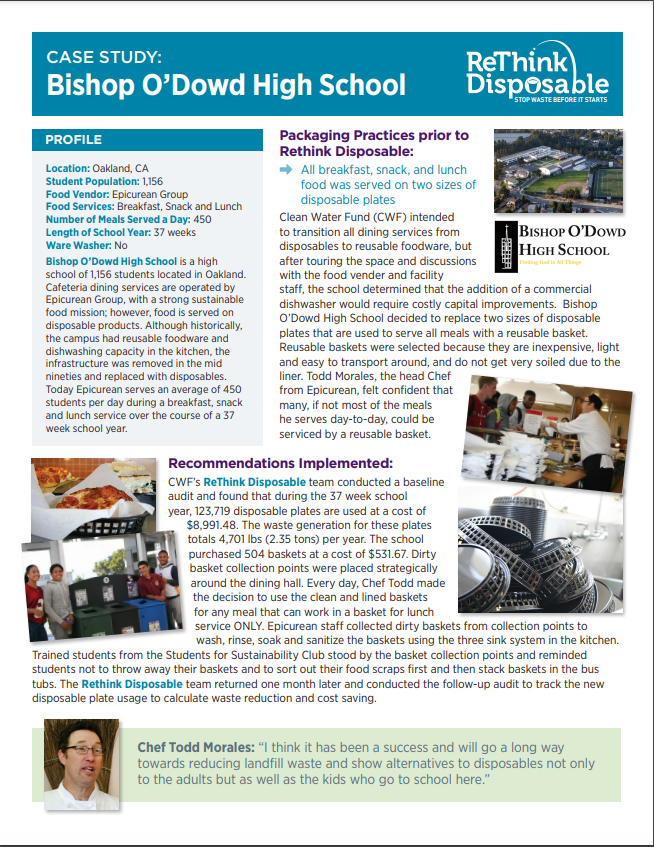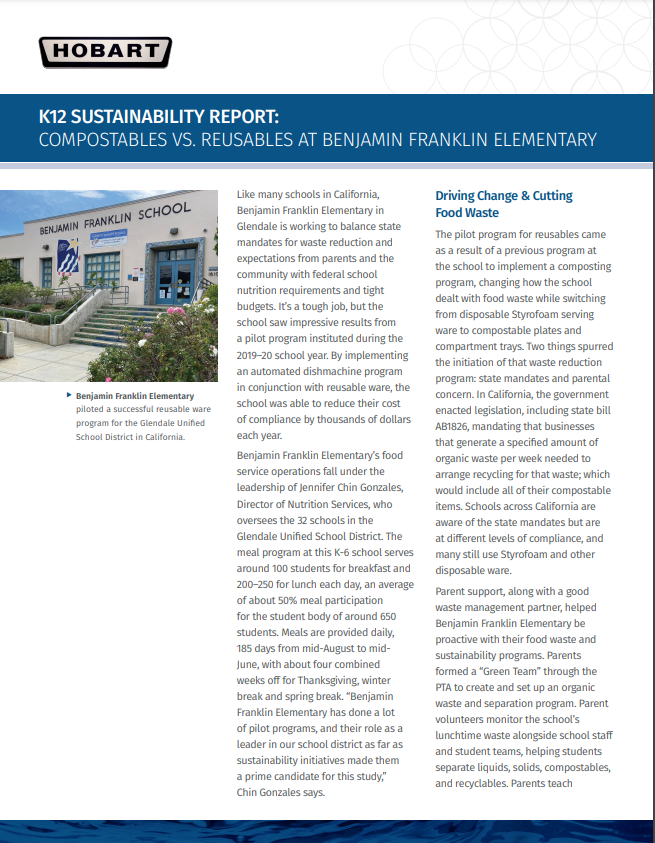
Physical Place:
Sustainable Food Service
START Metric #46:
Tableware & Trays
⬅ Back
Ideas & Resources

Reducing the environmental impact of school meals involves addressing the waste generated by single-use tableware and trays. This START metric focuses on eliminating unnecessary waste by transitioning to reusable, recyclable, or compostable alternatives. Single-use plastics and other disposable items contribute significantly to landfill waste, pollution, and resource depletion, with over 300 million tons of plastic waste produced globally each year (UNEP).
By adopting sustainable tableware practices, schools can significantly cut down on waste, reduce their carbon footprint, and foster a culture of sustainability. These changes not only benefit the environment but also serve as a valuable teaching opportunity to engage students and staff in waste reduction efforts.

Strategies for Sustainable Tableware and Trays
NOTE: This is not a prescriptive list; it just offers ideas to inspire action and can be tailored to fit the unique needs of each school.
Transition to Reusable Tableware
Replace single-use plates, cups, and utensils with durable, washable alternatives such as stainless steel or ceramic.
Invest in commercial dishwashing equipment to support the shift to reusable items.
Use Compostable Tableware
Source compostable trays, plates, and utensils made from materials like bamboo, sugarcane, or cornstarch.
Ensure the school has an active composting program to process these items effectively.
Adopt Recyclable Options
Choose recyclable tableware made from materials like cardboard, aluminum, or certain plastics.
Provide clearly labeled recycling bins in dining areas to minimize contamination.
Phase Out Single-Use Plastics
Eliminate items like plastic straws, cutlery, and Styrofoam trays in favor of sustainable alternatives.
Work with vendors to prioritize plastic-free packaging for delivered meals and snacks.
Promote Bring-Your-Own Programs
Encourage students and staff to bring their own reusable water bottles, lunchboxes, and utensils.
Provide incentives, such as discounts or recognition, for participants in these programs.
Create a Tray-Free Dining Experience
Remove trays from dining areas to reduce water and detergent use during washing, as well as encourage portion control.
Use smaller serving plates or bowls to minimize waste while maintaining a satisfying dining experience.
Engage Vendors and Suppliers
Work with food service providers to ensure they use sustainable tableware and minimize packaging waste.
Request eco-friendly options in procurement contracts.
Educate the School Community
Raise awareness among students and staff about the environmental impact of single-use tableware.
Use posters, videos, or presentations to showcase the benefits of reusable and compostable alternatives.
Host a Tableware Swap
Transition to sustainable tableware through phased implementation and swaps for older, less sustainable items.
Encourage fundraising or grants to support the purchase of durable options.
Track and Share Waste Reduction Metrics
Measure reductions in waste generated by switching to reusable or compostable tableware.
Share successes with the school community to reinforce the importance of these changes.
Combine with Food Waste Reduction Efforts
Pair tableware initiatives with food waste reduction strategies for greater environmental impact.
Use compostable tableware in conjunction with composting programs to create a closed-loop system.
Incorporate Sustainable Dining into Curriculum
Use the transition to sustainable tableware as a teaching opportunity for lessons on waste management and environmental science.
Involve students in monitoring waste reduction and exploring innovative materials for future use.
Hold a waste-free lunch day once per month.
How-To Guides
-

Ditching Disposables Toolkit
From the Center for Environmental Health, a toolkit for transitioning to healthier food-ware in K-12 Schools, including case studies, transition considerations & a planning guide.
-
-
Additional Resources
-

Reusable Food Service-ware Guide
Although not specifically for schools, this guide from the Clean Waste Fund, provides helpful information around alternative tableware, a break-even point calculator, and a cost-benefit calculation worksheet.
-
Case study: Disposables vs Reusables
From ReThink Disposable, a case study of a California high school transitioning to reusable service-ware, including cost assessments and recommendations.
-
Case study: Compostables vs Reusables
From Hobart, a case study of an elementary school transitioning from compostable to reusable service-ware, including cost comparisons.
-
District Case Study: Disposables to Reusables
A case study of a district that successfully transitioned 12 schools to reusables, with net annual savings.
-

Polystyrene Factsheet
From the Center for Environmental Health, essential information about the impact of polystyrene on human & environmental health.
-

Foodware Public Database
From the Center for Environmental Health, a database to help purchasers identify harmful chemicals, and includes biodegradable and compostable products.
-

GreenScreen Certified Foodware Database
From the Center for Environmental Health and Clean Production Action, a database of safer and more sustainable everyday items, such as bowls and plates.
-

Reusable Tray Options and Info
From the Green Team, information about alternatives to disposable trays, benefits and considerations, and best practices for commercial dishwashers.
-
Schools hold the key to a healthy, sustainable and regenerative future.
They are role-models and incubators that that nurture, educate and prepare each generation for adult life.
Schools have a unique opportunity and profound responsibility to become part the transition to a sustainable, regenerative future in which people and planet can thrive.
But how do we get there?

START: Sustainability Tracking, Analytics & Roadmap Tool was created by schools, for schools, to help them develop comprehensive programs for step-by-step progress towards sustainability, regenerative practice, and student empowerment.
START provides a Roadmap for School Sustainability:
It breaks down school sustainability into clear actions (‘metrics’), such as Minimizing Waste, Reducing Greenhouse Gas Emissions, and supporting Sustainable Transportation options.
However, research shows it’s not enough for a school to simply reduce its environmental impact.
Students and staff also need to learn about sustainability, and practice it in day-to-day activities, because this impacts their attitudes and behaviors when they leave school. That’s why START includes metrics like Sustainability Events for Students, Sustainability Course Content, and Sustainable Purchasing Practices.
How sustainable is our school now?
Schools use START to measure how sustainable they are now. A school’s START team investigates how their school currently operates to find their ‘sustainability baseline’ for each metric. For example, is our school a beginner, intermediate or advanced in sustainable water use? START enables schools to benchmark, track and visualize their current sustainability levels, as well as hard data around their waste, water, energy and greenhouse gas emissions.
Where should we go next, and do we collaborate for success?
What do we need to do to ‘level up’ in each metric? Once schools have their baselines, START helps them to set goals and plan for progress. START provides a central hub for school members to collaborate, document, and plan their school’s sustainability journey.

START is a subscription-based Whole School Sustainability dashboard.
It requires at least one adult school member to create a school’s START account, but it will need a team (students, teachers and staff) to grow a Whole School Sustainability program.
Interested schools can sign up for a demo or apply to set up an account.
Learn more about START here, and consider sharing the brochure with your school.
Let’s create a better future, one school at a time.
Contact us at guides@greenschoolsalliance.org if you have a free resource to contribute or recommend that can help schools take action around this specific sustainability metric.









